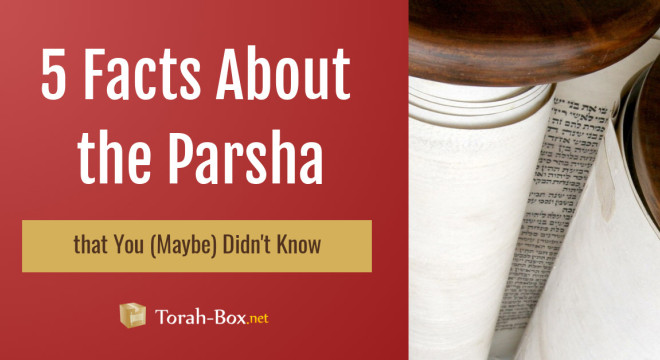
Tazria
5 Facts About Parshat Tazria That (Maybe) You Didn't Know
Discover and learn every week, "5 Facts" written on the weekly Parsha that you can share at your Shabbos table.
12:2
דַּבֵּ֞ר אֶל־בְּנֵ֤י יִשְׂרָאֵל֙ לֵאמֹ֔ר אִשָּׁה֙ כִּ֣י תַזְרִ֔יעַ וְיָלְדָ֖ה זָכָ֑ר וְטָֽמְאָה֙ שִׁבְעַ֣ת יָמִ֔ים כִּימֵ֛י נִדַּ֥ת דְּוֺתָ֖הּ תִּטְמָֽא׃
Speak to the Israelite people thus: When a woman at childbirth bears a male, she shall be unclean seven days; she shall be unclean as at the time of her menstrual infirmity.
1. What custom is derived from this verse?
The custom for new mothers to go to the synagogue, as soon as they are able to do so in order to hear kaddish and Kedushah, is meant to be reminiscent of the offering a woman would bring after birth.
Similarly, there is a custom for a father to be called to the Torah 40 or 80 days after birth, which is the time when a mother would have brought her korban.
12:5
וְאִם־נְקֵבָ֣ה תֵלֵ֔ד וְטָמְאָ֥ה שְׁבֻעַ֖יִם כְּנִדָּתָ֑הּ וְשִׁשִּׁ֥ים יוֹם֙ וְשֵׁ֣שֶׁת יָמִ֔ים תֵּשֵׁ֖ב עַל־דְּמֵ֥י טָהֳרָֽה׃
If she bears a female, she shall be unclean two weeks as during her menstruation, and she shall remain in a state of blood purification for sixty-six days.
2. Why is a mother impure for a shorter period of time for a boy?
The reason why a mother is “impure” for a shorter period of time for a boy (7 days) than for a girl (14 days), is so that the mother can be purified on time for the Brit Milah and fully enjoy the celebration.
Rabbi Shimon Bar Yochai explains that the reason the period of “impurity” is long for a girl, is because a woman is very happy when she gives birth to a boy. When she gives birth to a girl, however, she is somewhat saddened knowing that her daughter will also have to go through the suffering of childbirth.
12:6
וּבִמְלֹ֣את ׀ יְמֵ֣י טָהֳרָ֗הּ לְבֵן֮ א֣וֹ לְבַת֒ תָּבִ֞יא כֶּ֤בֶשׂ בֶּן־שְׁנָתוֹ֙ לְעֹלָ֔ה וּבֶן־יוֹנָ֥ה אוֹ־תֹ֖ר לְחַטָּ֑את אֶל־פֶּ֥תַח אֹֽהֶל־מוֹעֵ֖ד אֶל־הַכֹּהֵֽן׃
On the completion of her period of purification, for either son or daughter, she shall bring to the priest, at the entrance of the Tent of Meeting, a lamb in its first year for a burnt offering, and a pigeon or a turtledove for a sin offering.
3. Why does the new mother bring 2 types of Korbanot?
A woman brings two types of korbanot after giving birth. One of them is the Korban Olah, because of any resentful thoughts she may have had during her labor pain. The other, is the Korban Chatat, because, in her agony, she may have sworn not to live with her husband again. Such an oath would be invalid, both because it was made under duress and because a woman is required to have relations with her husband.
13:45
וְהַצָּר֜וּעַ אֲשֶׁר־בּ֣וֹ הַנֶּ֗גַע בְּגָדָ֞יו יִהְי֤וּ פְרֻמִים֙ וְרֹאשׁוֹ֙ יִהְיֶ֣ה פָר֔וּעַ וְעַל־שָׂפָ֖ם יַעְטֶ֑ה וְטָמֵ֥א ׀ טָמֵ֖א יִקְרָֽא׃
As for the person with a leprous affection, his clothes shall be rent, his head shall be left bare, and he shall cover over his upper lip; and he shall call out, “Unclean! Unclean!”
4. How does a contaminated person must dress?
The status of a Metzora is similar to that of a mourner. He must tear his clothing, he may not have his hair cut, and he must cover his head.
The metzora’s head is wrapped and his lips are covered. He dresses like a mourner.
Some explain that the word parua does not mean that he can’t cut his hair, but rather, that he must cover his head.
5. How does the newly contaminated person must behave in public?
The contaminated person must announce to everyone that he is impure by yelling “Contaminated! Contaminated!” so that others do not get contaminated as well. So too, it informs others to pray on his behalf.
Torah-Box.net Account
To access the entire Torah-Box.net website, sign up for free in less than a minute.
Shabbat Times
 Candle Lighting - New York
Candle Lighting - New York
Friday April 18th, 2025 at 19:20 *Shabbat ends at 20:23 *
change my location
* Times given as an indication, check the times of your community











